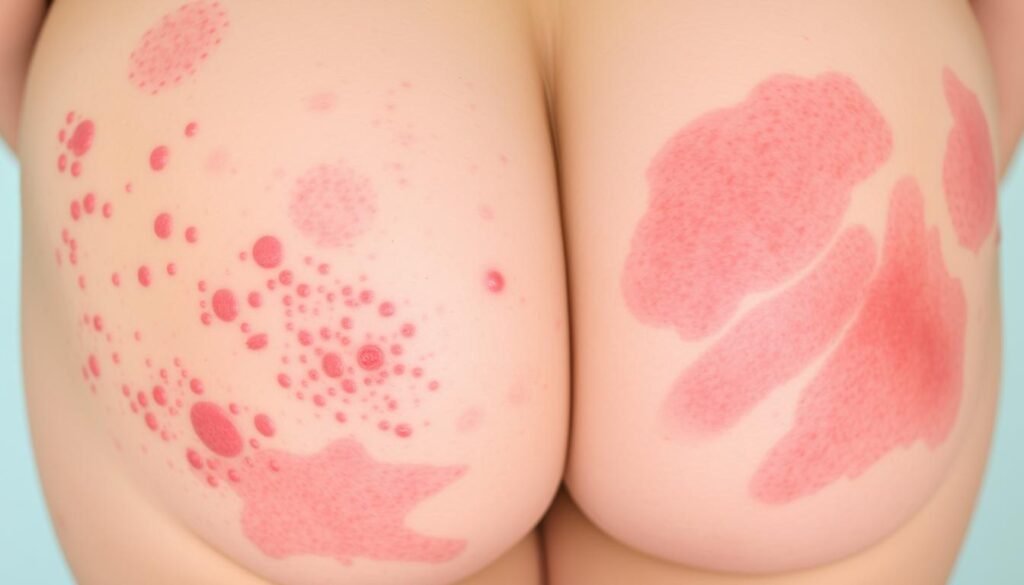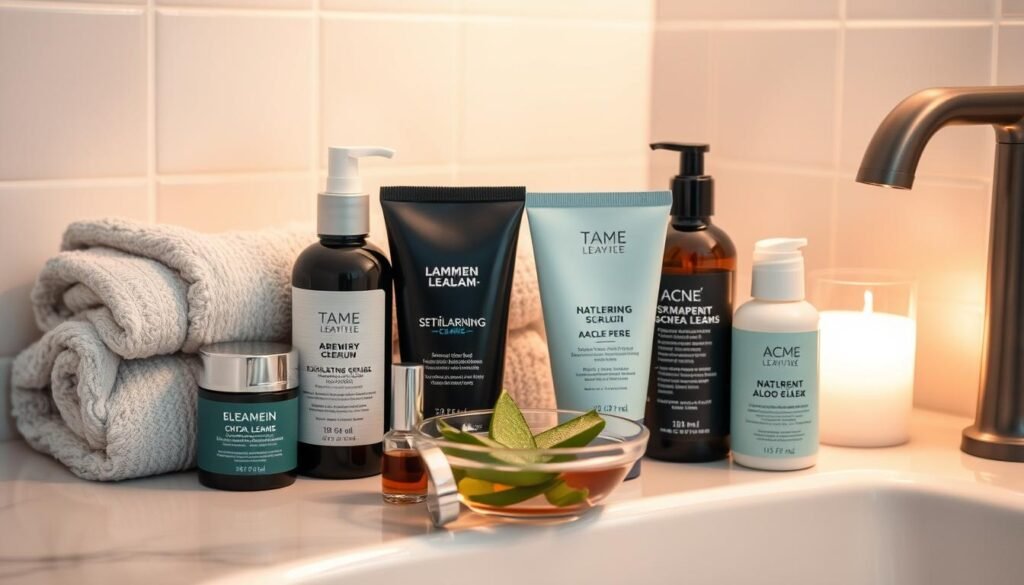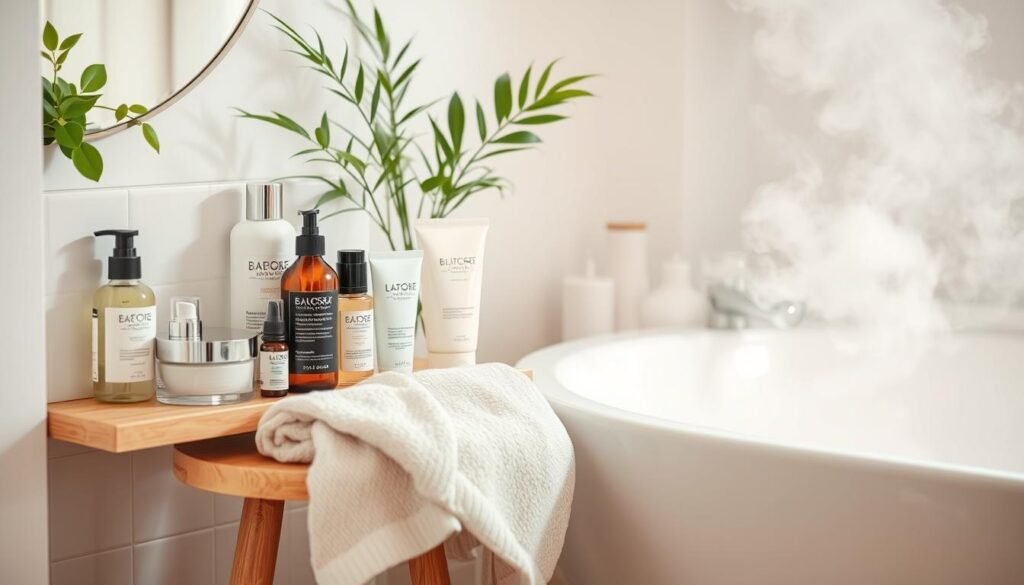Did you know almost 70% of adults deal with some acne, including on the buttocks? Pimples in this area can be both uncomfortable and make you feel self-conscious. This article will help you understand why butt acne happens, how to spot different bumps, and what to do about them.
Butt acne often gets overlooked, but it comes from things like irritation and bacteria. We’ll show pictures of pimples on buttocks and offer expert advice. You’ll learn about the causes and how to treat and prevent these annoying spots.
Key Takeaways
- Pimples on the buttocks are more common than many realize.
- Folliculitis can lead to painful red bumps and is a common cause of butt acne.
- Effective treatments for butt pimples include both over-the-counter and prescription options.
- Understanding personal hygiene and lifestyle choices can aid in prevention.
- Pictures of buttocks acne can help in identifying specific types of bumps.
- Natural remedies, such as salt water rinses, may also provide relief.
Understanding Butt Acne: An Overview
Pimples on the buttocks are both uncomfortable and embarrassing for many. They look like regular acne but come from different causes. Folliculitis is common, caused by irritated hair follicles. Another cause is keratosis pilaris. It happens when keratin builds up in the follicles, mainly affecting young people.
Acne vulgaris usually appears on the face, not the buttocks. Here, irritation comes from tight clothes, sweating, and not cleaning well. Also, harmful bacteria like staphylococcus aureus can cause serious infections like boils.
To prevent this acne, keeping clean is key. Shower daily and change after you sweat. Avoid picking at the pimples to prevent worse problems. Using noncomedogenic moisturizers helps by moisturizing the skin without blocking pores.
Folliculitis usually goes away by itself. But if it gets bad, seeing a doctor is a good idea. They might recommend creams with antibiotics or benzoyl peroxide washes. These can fight the bacteria that cause the acne.
To really understand and treat this acne, learning more is crucial. Getting the right diagnosis leads to the best treatment. This stops the acne from coming back. For more info on causes and how to manage butt acne, check out this resource.
Common Causes of Pimples on Buttocks
To effectively treat and prevent pimples on your buttocks, you must understand what causes them. Conditions like folliculitis in the gluteal area are common. This happens when hair follicles get infected, causing red bumps that look like acne. Wearing tight clothes, sweating a lot, and choosing non-breathable fabrics can make it worse.
Cystic acne on the buttocks occurs when sebaceous glands get blocked with sebum, dirt, and dead skin. A bacterial infection, often from Staphylococcus aureus, can make the condition even worse. Tight exercise clothes tend to increase irritation and friction, making some people more prone to this issue.
Keeping clean after exercising is crucial. Sweat and dirt left on the skin can lead to more pimples. By exfoliating regularly, you can remove dead skin and reduce oil buildup. This lowers the chance of getting pimples. To learn more about treating acne, check out this informative resource.
| Cause | Description | Prevention |
|---|---|---|
| Folliculitis | Infection and inflammation of hair follicles | Avoid tight clothing and practice good hygiene |
| Cystic Acne | Severe form of acne causing painful lumps | Regular exfoliation and moisture management |
| Bacterial Infection | Infection from bacteria leading to clogged pores | Maintain skin cleanliness, especially after sweating |
What Are Folliculitis and Its Connection to Butt Pimples
Folliculitis happens when the hair follicles, especially on the butt, get inflamed. This can come from bacteria, irritation, or things like rubbing. It causes sore spots or boils on butt cheeks that look a lot like pimples. The most common cause on the butt is a germ called Staphylococcus aureus.
Tight clothes, lots of sweat, or annoying skin products can lead to this problem. People who shave the wrong way or wear tight jeans might see it more. Knowing the signs, like red dots and sore bumps, helps tell it apart from other skin problems.
Keeping clean is key to handling folliculitis. Exfoliating often and staying dry are good steps. Treatments change based on how bad it is. Mild cases might just need creams from the store. But worse cases could need doctor-prescribed meds, like antibiotics.
If it keeps coming back, it’s smart to see a skin doctor. They can give advice that fits your situation best. Learning about folliculitis helps understand butt pimples better. It shows why caring for your skin matters a lot.
| Type of Folliculitis | Common Causes | Symptoms | Treatment Options |
|---|---|---|---|
| Staphylococcal | Bacterial infection (Staphylococcus aureus) | Pustules, painful bumps | Topical or oral antibiotics |
| Hot Tub | Pseudomonas aeruginosa from contaminated water | Red spots, pustules | Antibiotics, improved hygiene |
| Pityrosporum | Fungal infection | Acne-like rash | Antifungal treatments |
| Mechanical | Improper shaving, friction | Painful bumps | Avoidance of irritants, topical treatments |
Identifying Different Types of Bumps on the Buttocks
Knowing the types of bumps on your buttocks is key for the right treatment and your peace of mind. Many conditions can show up as pimples or rashes on the buttocks, each needing its own treatment. It’s important to tell these bumps apart to properly care for your skin.
Folliculitis is when hair follicles get infected, leading to red bumps that look like pimples. It can happen on the buttocks and other parts of the body. It’s often due to bacteria or blocked glands. Keratosis pilaris creates tiny, pointy bumps from keratin in hair follicles. It’s common on arms, thighs, and buttocks too.

Skin cysts develop from blocked glands or follicles, filling up with keratin. Keloids and skin tags, which arise from skin friction, can appear on the buttocks as well.
Conditions like eczema can show up as itchy, small bumps related to allergies or genetics. These rashes might leak fluid, causing more discomfort. Boils and hives also form from various causes, requiring close attention.
Identifying these skin issues involves noticing symptoms like itching, leaking fluid, or changes in skin color. Watching for these signs helps figure out if you’re dealing with buttocks rashes or something else. Quick action improves your skin’s health and your well-being.
Pimples on Buttocks Pictures: Visual Guide to Types
Understanding bumps on the buttocks is easier with pictures. Each type of bump looks different. Pimples on buttocks pictures make it clear and easy to understand.
Acne and Its Unique Characteristics
Acne looks red, swollen, and can be of different sizes. It’s often painful because of clogged pores and infection. Pictures help identify if you have similar skin issues.
Folliculitis: Symptoms and Appearance
Folliculitis happens when hair follicles get inflamed, causing pus-filled painful pimples. It’s often due to shaving or friction. Pimples on buttocks pictures show what to watch for with folliculitis.
Hidradenitis Suppurativa: What to Look For
This issue leads to painful lump clusters and can make sitting hard. It mostly occurs in areas like the buttocks. Recognizing it early can lead to quicker treatment.
Effective Treatments for Buttocks Acne
Finding the right treatments for buttocks acne is vital. You can choose from over-the-counter solutions or prescription medications for tough cases. Each option can meet specific needs, improving skin health.
Over-the-Counter Solutions
Over-the-counter products are great for mild buttocks acne. Ingredients like benzoyl peroxide and salicylic acid target acne-causing bacteria. Washing regularly helps prevent conditions like folliculitis, which affects hair follicles.
For those who work out a lot, washing twice daily is key. This routine cuts down on bacteria.
- Benzoyl peroxide: Reduces bacteria and inflammation.
- Salicylic acid: Helps unclog pores and exfoliate dead skin.
- Tea tree oil: Natural alternative with anti-inflammatory properties.
- Non-greasy moisturizers: Products with lactic acid may reduce the risk of folliculitis.

Prescription Medications for Severe Cases
If your acne gets tough, seeing a doctor is wise. For severe acne, they might prescribe topical antibiotics. These work against stubborn outbreaks, often caused by bacteria like S. aureus.
When simple treatments don’t work, stronger oral antibiotics or topical remedies may be needed. They fight the root of the infection.
| Treatment Type | Purpose | Typical Use |
|---|---|---|
| Over-the-Counter | Reduce bacteria and inflammation | Daily application on affected areas |
| Topical Antibiotics | Treat severe outbreaks of folliculitis | As prescribed by a healthcare professional |
| Oral Antibiotics | Target resistant infections | For patients with chronic or severe cases |
| Tea Tree Oil | Natural anti-inflammatory remedy | Applied directly to pimples |
| Non-Greasy Moisturizers | Prevent clogging and irritation | After cleansing routine |
Self-care plays a big role in fighting buttocks acne. Staying clean and avoiding tight clothes help a lot. This makes treatments work better, offering a full approach to managing buttocks acne.
Natural Remedies for Pimples on Buttocks
Looking into natural remedies can help with butt pimples. Essential oils and proper exfoliation techniques play a big part in achieving clearer skin. A gentle skincare routine can ease discomfort and stop more breakouts.
Essential Oils and Their Benefits
Tea tree oil is a popular choice for treating butt pimples because of its strong antibacterial qualities. It helps prevent the bacteria that cause folliculitis, which is often behind butt acne. Turmeric is another great choice because it fights bacteria.
Using turmeric in products or as a paste can give good results. Natural treatments like acetic acid found in apple cider vinegar are also helpful. They lower bacterial growth and calm the skin.
Exfoliation Techniques and Products
Regular exfoliation prevents butt pimples by removing dead skin and pollutants. This keeps hair follicles clear. Choose gentle exfoliation products that don’t harm the skin. A gel moisturizer with salicylic acid is good for hydration and new cell growth.
Gentle exfoliation, along with natural remedies, offers a full skincare approach. It makes managing and preventing butt acne easier.
Preventative Measures to Avoid Butt Acne
Keeping your butt skin healthy means taking some steps. First, choose clothes that are loose and breathe well. This reduces sweat and friction which both can cause rashes. Shower right after you work out to wash away sweat, oil, and dirt. This keeps the skin clean and clear.
Using the correct cleansers is also key. Try using Panoxyl 4% Benzoyl Peroxide Cleanser because it kills germs. It’s good for your back and chest too, not just your butt. Then, use CeraVe Renewing SA Cleanser. It helps open pores and control oil without drying or irritating your skin.
For those with hormone issues, it’s important to understand how it affects your skin. Treating your skin with salicylic acid can help. It gets rid of dead skin and controls oil, keeping acne away. Also, using creams with glycolic acid or azelaic acid can help. They make dark spots lighter and fight the bacteria that cause acne.
When shaving, go with the hair’s grain and use enough lubricant. This keeps the skin safe and prevents red bumps. Using antibacterial soaps like CLn body wash kills bacteria that can cause acne. Also, change into dry clothes right after exercising. This is good for your skin’s health and cleanliness.

The Role of Lifestyle Choices in Skin Health
Your skin health is deeply connected to your lifestyle choices. These choices greatly affect your skin’s ability to prevent acne, including on the buttocks. By living a balanced life, you help your skin stay healthy and reduce the chance of getting pimples on your butt.
Eating lots of whole foods, fruits, and vegetables is good for your skin. Too much sugar can lead to more acne, including on your butt. The right foods can prevent inflammation that causes acne. Also, drinking enough water keeps your skin moist and removes toxins.
Working out helps in many ways. It boosts blood flow, lowers stress, and helps maintain a healthy weight. Not moving much can cause tight clothes to trap sweat, leading to more bacteria and worse acne on your butt. Staying active reduces stress and boosts your skin’s health.
Managing stress with yoga or meditation can really help your skin. Stress can mess with your hormones and make skin problems worse. Using the right skin care products is also key. Choose ones that won’t block your pores, especially if you often get breakouts on your butt.
Choosing the right lifestyle can make your skin healthier and prevent acne on your butt. By paying attention to how your daily actions affect your skin, you can see big improvements. Adding good habits to your day can make your skin look and feel better for a long time.
| Lifestyle Factors | Impact on Buttocks Acne Health |
|---|---|
| Diet Quality | High sugar intake contributes to acne. |
| Hydration | Water intake helps detoxify the skin. |
| Physical Activity | Reduces stress and improves circulation. |
| Stress Management | Minimizes hormonal fluctuations affecting skin. |
| Skin Hygiene | Using non-comedogenic products prevents breakouts. |
Conclusion
Understanding pimples on the buttocks is key to better skincare. We’ve looked at causes like tight clothes, too much sweat, and genetics. It’s important to know that people of all ages can get these breakouts. Yet, they’re more common from ages 11 to 30.
To manage buttocks acne well, mix treatments and preventive steps. Using exfoliating body washes with glycolic acid helps. It tackles rough skin and blocked pores. Also, bathing regularly with antibacterial soap cuts down on acne. Wearing loose clothes also reduces friction and skin issues.
Having a good skincare routine is crucial for handling buttocks acne. By following these tips, you can work towards clearer skin. Caring for your skin isn’t just for now but for future health too. This way, you can deal with butt pimples and improve your skin’s overall health.